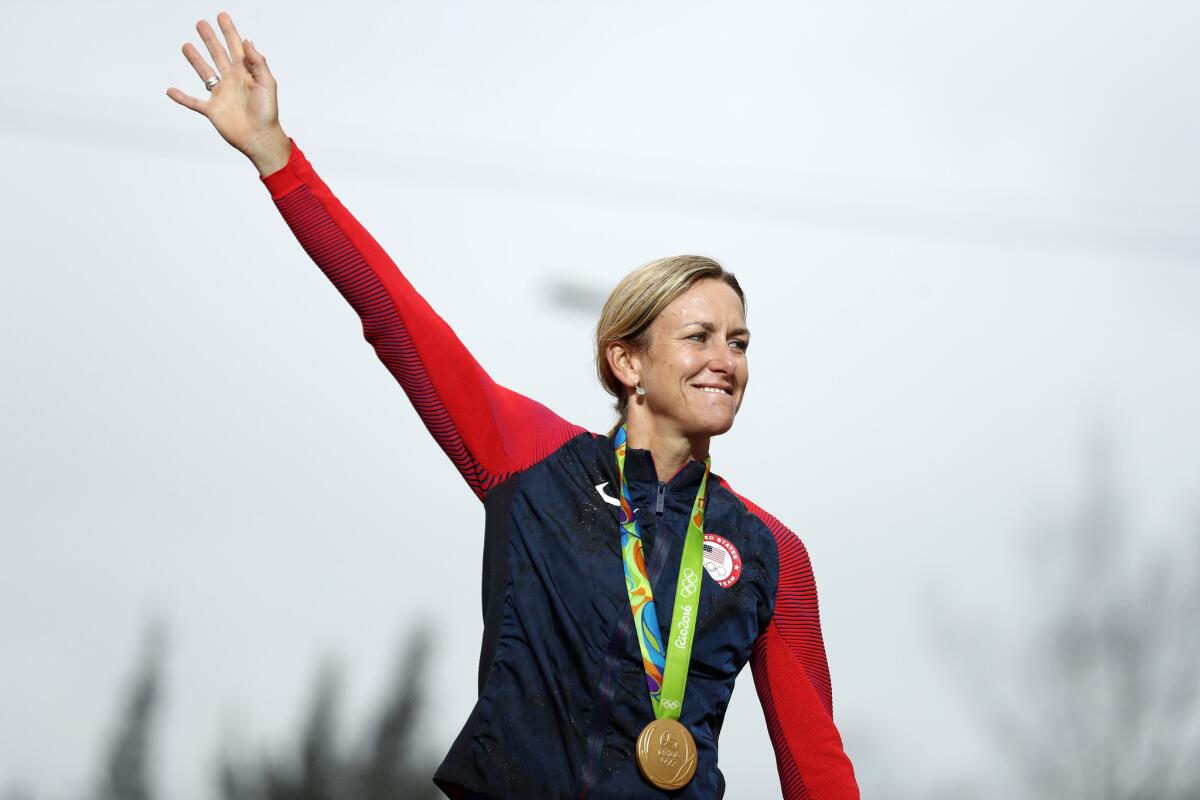Column: Kristin Armstrong’s juggling act results in a third gold medal

Reporting from Rio de Janeiro — This was for every woman whose life is a constant balancing act, the way Kristin Armstrong juggles being a wife, mother, and community health advocate in addition to balancing on two narrow wheels while she races her bike down sometimes treacherous, rain-slicked streets.
The gold medal she won Wednesday in the Rio Olympic cycling time trial — her historic third in that event — also was for everyone who has shunned practicality and convention to follow their heart, for every man and woman who has ignored the date inscribed on their birth certificate in order to satisfy a competitive hunger that never grows old.
“You can set a goal and accomplish anything you want. It doesn’t matter your age. It doesn’t matter where you’re from. I believe it comes between the ears. I believe it’s in your head,” said Armstrong, who will be 43 Thursday, the first day she will wake up as the first Olympic cyclist to win the same event three times, the first female Olympic cyclist to win gold medals at three Games, and the oldest female Olympic cycling champion.
“For all the moms out there, I hope that this was a very inspiring day.”
How could it be anything but? And not just for moms, though having her son Lucas and her husband, Joe Saviola, greet her after she had endured rain and buffeting winds along a technically challenging, 18.6-mile course just enhanced a day that had been full of risk, joy, and tears — and a surprise nosebleed.
Lucas, who will be 6 in September, had joined her on the medals podium four years ago in London but didn’t grasp the magnitude of her accomplishment. He’s old enough now to have gone to races with her, to have watched her strain and sweat and to have shared her joy.
That’s why he was confused when she wept at the finish line Wednesday after she had covered the course in an exhausting 44 minutes, 26.42 seconds. “He tucked his head into my arm and said, “Mama, why are you crying?’ ” she said at a news conference. “And I stopped and he said, ‘You won.’ I said yeah, and he said, ‘So why are you crying?’
“I said, wow, another life lesson to teach my son. Why is it that we cry when we’re overwhelmed with happiness and joy?”
That overload of emotions was entirely understandable.
Armstrong, whose selection to the U.S. team had been unsuccessfully challenged by two other athletes, led the race early, fell three seconds behind Russian Olga Zabelinskaya, and worked herself back into a good position with about five kilometers (a little over three miles) to go. That’s when her coach, Jim Miller, stepped in via radio.
“He said, ‘You’re in the medals. Now it’s up to you on what color you want to bring home,’ ” she said. “That hit me really hard.”
It was precisely the right thing to say to the woman who sheepishly admitted she can’t mute her competitive instincts. “My family, they want to tell me that I don’t need to win at dominoes every Christmas and I say, yeah, I kind of do,” she said. “That’s how I am.”
Armstrong — no relation to disgraced Tour de France doper Lance Armstrong — had retired after her time-trial win at Beijing in 2008 to have Lucas. She retired again after she repeated as champion in London and underwent several hip surgeries in 2013. Neither retirement stuck. “As an athlete, we miss those goals,” said Armstrong, who lives in Boise, Idaho, and works at St. Luke’s Hospital as its director of community health.
So she set a new goal, of making it back to the national championships last year. She not only made it but won. That was enough to set her on the path back to the Olympics, though she continued to work full-time until she cut back to 16 hours a week in February. “It’s hard work for everyone around me,” she said, “but the hard work really paid off today.”
In joining speedskater Bonnie Blair as the only American women to win three gold medals in the same event at any Olympics, Armstrong fended off Zabelinskaya (44:31.97) and road race gold medalist Anna van der Breggen of the Netherlands (44:37.80).
Her task was complicated when she developed a nosebleed about 13 kilometers into the race, which had happened only two or three times that she could recall. It took a while before she became aware of it. “I thought it was just water,” she said, then tried to swipe it away only to see her hands were bloody. “I thought, ‘Oh well here we go. It’s not a beauty contest out here today,’ ” she said.
Her victory Wednesday was a thing of beauty, a triumph of the spirit over age and conventional wisdom. There’s a lesson in that for us all.
More to Read
Go beyond the scoreboard
Get the latest on L.A.'s teams in the daily Sports Report newsletter.
You may occasionally receive promotional content from the Los Angeles Times.





